- About the language acquisition process, I think I foremost learned that mistakes are the most important part of the process along with asking about things that you don’t know. There were so many times when I would be speaking with my host family, make a mistake, and then immediately be corrected by usually the mother of my host family. At first, these sorts of moments were maybe a little embarrassing (for example, a waiter once asked for my name, and I told him it was hot outside). But now I will not mistake, for example, “spannend,” “exciting,” with “entspannend,” “relaxing,” because the mother of my host family corrected me when I told her I just received “ein entspannendes Email,” really intending quite the opposite. On a similar note, when I don’t know a word or when I am unsure about what something is or where something is, I need only ask, and the asking is crucial to learning about the language and the culture. Inquiry gives an opportunity to practice speaking with locals and to learn things that only locals know. It’s rather interesting and important for getting an ear for the language. I learned quite a bit, and I certainly did meet my pre-departure goals. I am certainly more comfortable having casual conversations with other German speakers; towards the end of my stay, I became very comfortable with a German-German dictionary; I have begun reading some German theology with a good amount of success; and I am very comfortable making a fool of myself with all sorts of good German mistakes. It was quite the adventure, and I have grown much as a person and in my knowledge of the German language.
- The SLA program has provided me an invaluable experience in shaping my view of the world. Of course, I learned much about Germany, branching out of my American bubble in that way; however, all of my classmates came from all over the world, and so many worldviews converging in such a coincidental and spectacular way was truly a gift. My friends and I often exchanged variances among our countries, things from humorous colloquialisms in our own mother tongues to serious political or moral topics. The differences were interesting, but I was surprised by how many similarities came up. In an attempt not to be so presumptuous, I had imagined that everywhere is very different from the United States, and that it is; however, people are people. Humanity is one, and so it is very important to respect others and regard others as equals in dignity and uniquity. If I were to give advice to prospective SLA applicants, I would certainly say to prepare to be amazed. The world is rather large and diverse, but the kindness and generosity of other people crosses even language barriers. To learn another language is to learn a new people and literally a new manner of thinking. It is quite the privilege, and I encourage all prospective students to take advantage of this unique opportunity.
- From here, there is much that I hope to do with my newfound knowledge of German language and culture. One of them is, naturally, to return to Germany one day, for it is a place that I have absolutely loved. Another is to read. I want to study literature in different languages professionally, and I have purchased quite a good start of German books that I will have the great pleasure to read during the remnant of my summer and again and again throughout my life. Thanks to this experience, I have opened a door to a world of new literary tradition and history that I greatly look forward to exploring. My host family has also given me an extensive list of German films that are worth my viewing, so that will also give me a good way to keep up my German while not in Germany. But more broadly, I have found a new way of understanding others and inexplicable amazement at the diversity yet the singularity of us all, and so while my time in Germany has given me tools that will help me professionally, the more important fruits of my SLA experience will inform how I am to interact with others and with what purpose and understanding I will act in bettering the world.
Author: Jake Theriot
The Wonders of Rauris
In my last post, I mentioned my trip to Rauris, Austria, with my host family. Again, I had an absolutely wonderful time, and I am extremely grateful to my hosts for bringing me along. We did a couple of really neat things while we were there which I’d like to say more about now.
When we first arrived, we took a walk around the village, allowing me to get a feel for the area. The first thing that I found most striking was—naturally—the scenery. The small village is set smack in the middle of the Alps with mountains of various heights in every direction one looks. Lots of beautiful greens, greys, whites, and blues. Absolutely gorgeous. It is quite easily the most beautiful place that I have ever visited, and, thankfully, my host family said that I will always be welcome back whenever I find myself in the area. Needless to say, I will be trying very hard from now on to find myself in the area again.
After dinner that night, we had drinks and shot the breeze with some neighbors. That was quite an experience for a couple of reasons. The first was that, especially in this area of Austria, people speak a strongly accented dialect of German. The dialect is very throaty, so, for example, while someone speaking high German would ordinarily pronounce the “ch” in the German word “machen” the same way one begins the English word “huge,” someone from this area would sound as if they were seriously clearing their throat. It’s rather impressive and very interesting to me, but at first that and other dialectical differences presented a bit of a problem for my understanding them. I soon adjusted and was able to have a lovely conversation with the neighbors.
The second reason is that, taking a look around their backyard which was full of fruit trees and plants, I realized just how many people in Germany and Austria grow or make their own produce or foods. This family had lots of plants that produced fruits and vegetables, and one of the favorite things of theirs (and apparently the rest of Rauris) to make is schnapps (“Schnaps” in German). The process is relatively simple. These neighbors explained to me that one simply takes pinecones, fruits, or other plant-based things for flavoring, collects them in a jar, pours some hard alcohol over them, and then waits a couple of weeks for the concoction to ripen. And I must say, they are quite tasty. One of the neighbors handed me a small sip of his homemade schnapps, saying, “Das ist Medizin!”: “Now, this is medicine!” His meaning was double since a couple sips can be a sort of medicine for the mind but also since it is may also be used as a home remedy for headaches, stomach aches, or even fever. I cannot confirm the latter, but their schnapps were pretty tasty, and it was neat to experience this traditional beverage of the area.
Of course, Germans and Austrians grow more than schnapps materials at home. My host family grows their own fruits and makes their own jellies and jams. Many people grow their own vegetables with which they cook. In Rauris, many people own farms and raise their own cattle or livestock for meat. This was just another example of the efficient self-sufficiency of many German people.
I certainly have had more than just this one fascinating experience since my time in Germany, and I am sincerely grateful to everyone who has made my trip possible. Today is my last day in Germany, and, while I do look forward to seeing my family and friends again, I am sad to leave such a wonderful place. My German has improved significantly along with my notion of language as a whole, my view of an incredible nation, and my ability to adapt to new surroundings. Thank you all for reading my blog posts!
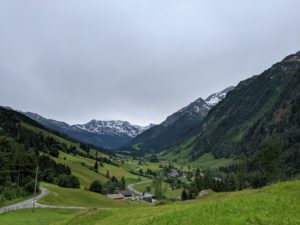
Prost!
All about U.S.
I’m by no means the most knowledgeable person when it comes to politics and government policy, but even on campus I love talking with international students about what they think about the United States and how it compares to their homes. I certainly have had a number of wonderful opportunities to do the same here in Munich! The reactions have been rather interesting.
The United States is obviously a large country, and so one of the most common replies to my question ran along the lines of how difficult it can be to find real diversity. Even from Notre Dame’s campus, if one drives twelve hours west, south, or east, one still finds oneself in the same country where the same language is spoken ubiquitously despite crossing perhaps even more than one time zone. Doing so from Germany would certainly land you in a different country, speaking altogether different languages, perhaps even using a different currency. Of course, the European Union, as the mother of my host family pointed out on our drive to Austria, makes Europe more accessible, but it by no means makes it as homogeneous as the United States.
On the other hand, generalizing the United States is also difficult because of its size. Even the book that we use for class makes the United States feel a bit like an oddball, often asking questions like “What is it like in your country?” I simply cannot speak for the minute cultural variances which span the nation, whereas my classmates, all of whom are not from the United States, have less trouble speaking on behalf of their country as a whole.
After posing this question to a classmate, she addressed the difference in health care systems. In Germany, the government guarantees health care for everyone, whereas in the United States, the system is obviously not so. My classmate was shocked that the U.S. has such a successful economy and yet does not provide health care for its citizens. Several others with whom I spoke said that having healthcare guaranteed by the government is a great comfort. Indeed, the implications of having such a system are complex, yet I find most interesting the way in which these systems affect the individual lives of the people they support. Germany has in so many ways proven extremely interesting in comparison to the United States!
In other news, my lovely host family took me with them for a weekend to their house in Rauris, Austria, a small village in the middle of the Alps. It’s quite easily the most beautiful place that I’ve ever been. It was a little tricky at first understanding the thick accent that the locals have there, but I caught on quickly and thoroughly enjoyed meeting my host family’s neighbors. Here’s a picture of me there!
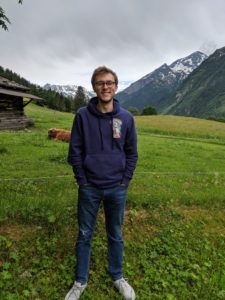
Alles geht mir sehr gut in Deutschland, und ich freue mich auf die Abenteuer, die ich noch haben werde! Bis meine nächste Post!
Das Herz Bayern
“Das Herz Bayern,” “the heart of Bavaria” is a lovely and entirely fitting moniker of Altötting, Germany, where I have decided I will certainly retire when I have made my millions. A beloved town of Pope Benedict XVI, whose childhood home in the nearby town Marktl am Inn I was also fortunate enough to visit, Altötting has found a special place in my heart with its timelessness, its smallness, and its unique devotion to the Blessed Virgin Mary. Bavaria is the most Catholic state in Germany, and Munich has a number of interesting roots in the Catholic Faith; however, it wasn’t until I visited Altötting that I could see a people really grounded in their love for Christ and in such profound way.
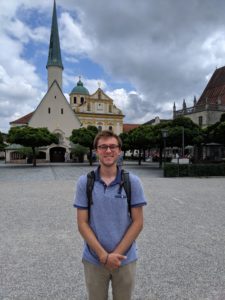
Altötting has become a regular pilgrim site for a number of Catholics from all over the world due to the steadfastness of its patron, Our Lady of Altötting, the mother of Jesus. Many have come from near and far seeking healing through the intercession of Our Lady, and many, after visiting the real center of the town, Gnadenkapelle, which houses a beautiful statue of “Die Schwarze Madonna,” “the Black Madonna,” have received their sought-after healing. In fact, both inside and outside, paintings thanking Mary for her intercession line nearly every wall, leaving hardly any view of the wood on which they hang. Most say something to the effect of, “Maria hat uns geholfen. Tausend Dank,” “Mary helped us. A thousand thanks!” Not only do these paintings exist as proof of her aid, but on a cross outside the chapel hang a number of crutches, braces, and canes which were no longer needed after their users’ trip to the Gnadenkapelle. The devotion was penetrating.
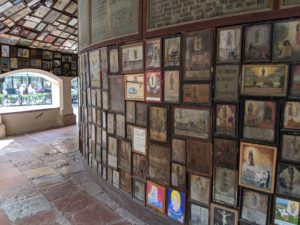
Outside of Altötting, however, the Christian influence remains in the number of public Christian holidays, some of which are observed only in Bavaria, others all throughout Germany. Since I have been in Germany, I have gotten off from school on three separate occasions due to public Christian holidays. In fact, today, June 20, is “Fronleichnamstag,” or Corpus Christi, a public holiday for all of Bavaria. However, what intrigues me is that, upon talking with a number of people about the holiday, no one knows what it’s all about. The priest celebrating Mass today explained it in the context of today’s Gospel reading from the Gospel of Luke in which Jesus feeds a couple thousand people with no more than five loaves of bread and two fish. Corpus Christi is an especially Catholic celebration of the Body and Blood of Christ, really present in the Eucharist, the spiritual food through which one may be sustained by Christ. My teacher in the Carl Duisberg Centrum, a native of Munich, nor any of my classmates whose homes span four different continents knew why we had the day off (Admittedly, I was also unaware of the real significance of the holiday). The mother of my host family also did not understand the holiday, nor was she surprised that most people were unsure of its significance either despite the fact that the entire state gets off of work for the entire day for it. Although Bavaria is largely culturally Catholic, indeed with its large number of practicing Catholics, Munich, most of Bavaria, and all of Germany are growing largely secular, with many people leaving Catholicism and Christian faiths of all kinds. I have found no real explanation for this trend, however, but I look to places like Altötting with confidence that the heart of Bavaria beats strong.
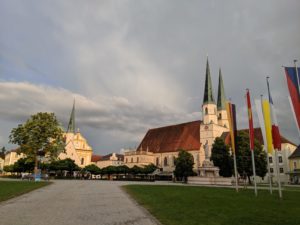
Maria hat uns geholfen. Tausend Dank. Bitte, hilfe uns weiter!
Friede sei mit Ihnen!
Grüßen aus München!
Greetings from Munich, each and all!
Time is certainly starting to fly for me here; however, I have already had a great many fruitful experiences in my brief time abroad.
So far, I have made several walks through the city, checking out whatever places look interesting to me. I’ve visited a number of absolutely beautiful churches here in Munich, and I’ve found a couple of neat bookstores, from one of which I bought a couple of German books. I’ve made a trip to Heidelberg to visit a Notre Dame professor who showed me around his city. I took a hike with the mother of my host family and their dog Stella around Andechs, a Benedictine monastery not far from Munich. Although not exactly German-related, I was even fortunate enough to catch Notre Dame’s Glee Club performing in a nearby church. I’m making use of everyday in the city and learning more about German and Germany with every step!
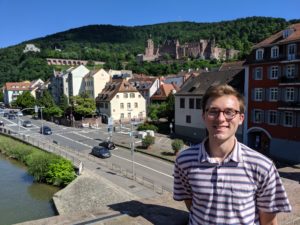 Here I am in Heidelberg!
Here I am in Heidelberg!
One of my first priorities upon arriving in Munich was to find a Catholic church where I could attend a daily Mass that would fit my schedule. Fortunately, I was quick to find a beautiful church just a short walk from the S-Bahn stop at Karlsplatz. It also just so happens that St. Michaels Kirche is a Jesuit church, immediately a little comforting for me who attended a Jesuit high school and who has a number of friends and former teachers in the Society of Jesus (the Jesuits). Here’s a picture that I took of the interior:
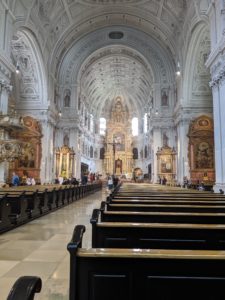
While I was comforted with that sort of familiarity, I was rather outstandingly not German at first in my not knowing the responses in Mass. I still grab a hymnal with most of the responses at the beginning of Mass, and at first, I was very clumsy with the way I would flip back and forth from response to psalm to hymn back to response, etc. I’ve memorized almost all the responses by now, but the one that made me the most nervous, the one that required me to pay very close attention to what fellow church-goers were saying to me, was what to say at the Sign of Peace. It was written nowhere in my Gotteslob hymnal, and everyone spotted me as the goofy American pretty darn quickly. So everyone just gave me a pitiful smile or mumbled softly as I shook a hand and likewise whispered some incomprehensible nonsense to hide my ignorance.
Finally, after shaking a number of hands and searching for the right words to say, I took a shot in the dark and gave the straight translation from English to German. After piecing together mumbled words and hoping that this phrase had not changed overseas–of course expecting to be horribly wrong and consequently embarrassed for making a silly mistake–however, I was pleased to be met with widened eyes and a hearty smile from a sweet lady when I hesitantly gave her a “Friede sei mit Ihnen.”
Indeed, a very simple saying, almost as quick as slang, but the formula for which is crucial to my partaking in the community around me. Since then my confidence in fully participating in the German Mass has increased in me the ability to speak more fluidly with locals and with my classmates. Just this simple colloquial phrase which almost every Catholic knows has done much to change the way I participate in and mentally approach German culture. Through this exchange, which is very familiar to me in English Masses, I have felt more welcome in Germany and more confident in my fitting in with the locals around me. Such a simple phrase has helped me become a little more German!
And so, I leave you with this as I embark on the next adventure in Germany:
Friede sei mit Ihnen!
P.S. German has even followed me out of Germany a bit. I took a quick trip to Rome on a long weekend, and when I turned around in Mass to give a Sign of Peace to the woman behind me, I was surprised to hear “Friede sei mit Ihnen!” I was overjoyed to be able to respond likewise.